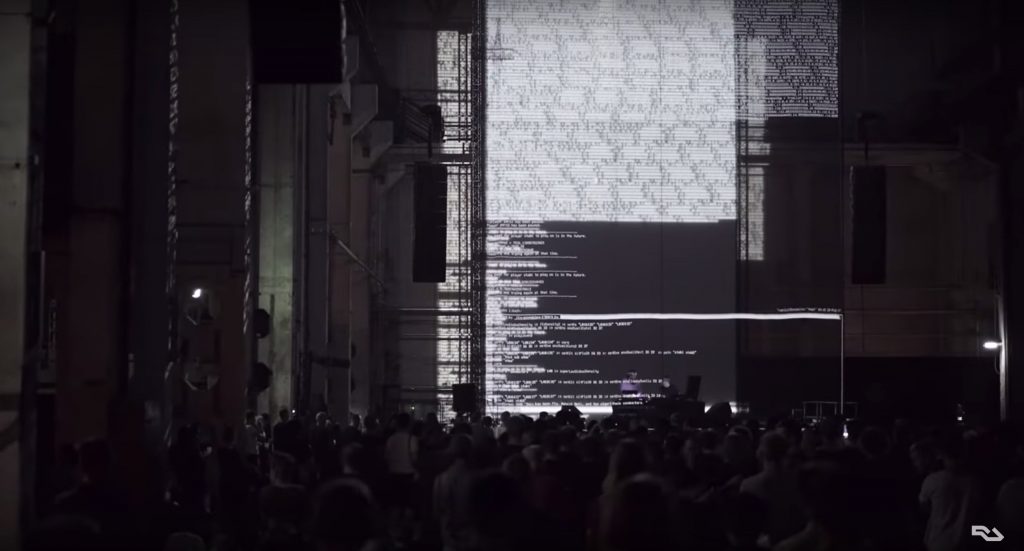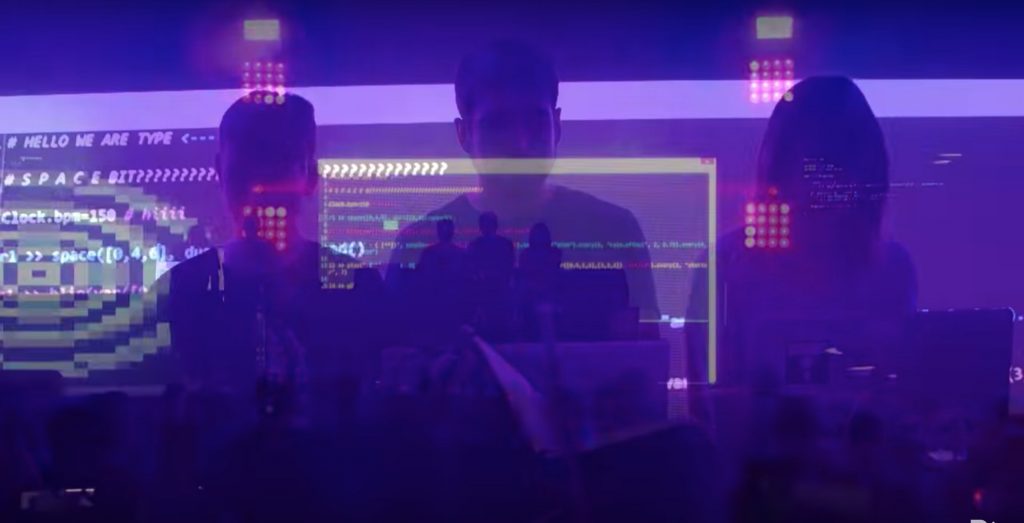Raving to Algorithmic Beats: The Hacker Class in Search of Novelty
The interest of the hacker class lies first and foremost in the free expansion of the vectors of communication, culture and knowledge around the globe…Only when free to express itself through the exploration and combination of any and every kind of knowledge, anywhere and everywhere in the world can the hacker class realize its potential, for itself and for the world.
– McKenzie Wark, A Hacker Manifesto [381]
What is Algorave?
Earlier this year, Resident Advisor published the above short feature on the Algorave movement, joining a growing list of high-profile media outlets (such as WIRED, The Guardian,Mixmag) which have covered this emerging tech-minded art-form with a good dose of intrigue over the past several years. As explained in the video, Algorave is an improvisatory artistic technique that uses live programming of algorithmic compositions in order to generate dance music, synchronized to live-coded visual interfaces which publicly display in real-time the messy code-editing process (pic 1&2). According to Joan Armitage, “Algorave brings the mundanity of computer programming to a social context where expertise is lived and live, where immediacy is skill and labour is performed” (32). What’s more, everything is done with free/open-source software that requires no experience in software engineering. Due to its commitment to liveness, spontaneity, and frenetic experimentation, the aesthetic experience offered by Algorave has an alien futuristic flair and a sharp experimental edge thereby eliciting forms of engagement that gravitate more towards the conceptual and cognitive than the sensual, although, one might say, it is precisely the dialectic between those two that preoccupies the movement. After all, as its very name suggests, Algorave is a playful synthesis of cerebral technicality (i.e ultra-geekiness) and ecstatic transcendent fun.

Pic 1 
Pic 2
Who is the Algorithmic Generation?
Given its conceptually-driven nature as well as its rigorously-theorized intellectual concerns, it comes as no surprise that the movement has very strong academic roots. One of the founders of the movement, Alex McLean, (interviewed via video chat in RA’s feature) holds a PhD in Arts & Computational Technology and has been highly active in the production of academic scholarship on algorithmic music. The idea of an underground subculture emerging from academic circles might seem a bit strange, if we think of the working-class roots of techno-rave culture (also, what happened to the common wisdom that ‘those who can’t do, teach’?), but it perfectly reflects the shifting terrains and dynamics of class-struggle in the age of the digital economy, when the concentration of economic power is being motored by the commodification of information. As McKenzie Wark noted already back in 2004, the transition to a knowledge economy formulates as one of today’s central antagonisms the struggle between those he calls ‘the hackers’, namely the producers of knowledge and innovations (such as researchers, authors, artists, biologists, chemists, musicians, programmers) and the ‘the vectoralists,’ the ruling class which appropriates these goods and whose power lies in “monopolizing intellectual property—patents, copyrights and trademarks—and the means of reproducing their value—the vectors of communication” (032). Thus, following Wark, I would call the Algorave a hacker-class movement, a form of collective expression reacting to the privatization of information by the vectoralist class, in the form of intellectual property.
Against Algorithmic Anxiety
What is then the importance of using algorithms for the purpose of creative expression? As the live-coder Renick Bell argues in the video, the growing public anxiety and mistrust induced by algorithms is often misguided and relies on overly simplistic understandings of what these technologies are and how they function. Thus, interventions at the level of perception become necessary. In the context of algorithmic composition, algorithms become not simply a new instrument for the production of sound but also a tool for sense-making as such: “[W]hen working with algorithms, the performer is part of a cybernetic control system consisting of a feedback loop of perception–cognition–action. New instruments not only augment our abilities to produce sound, but also our abilities to perceive it, since the body can be regarded as both subject and object, and perception is an action following patterns shaped by the available tools” (Dahlstedt 19). Algorave performances have therefore the potential to de-mystify algorithmic programming while harnessing and mobilizing its different affordances in creative practice.
Against Retromania
It is such a spirit of creative experimentation that our times seem to be lacking. Towards the end of the video, one of the interviewees invokes the late Mark Fisher’s Capitalist Realism (2009), a book that describes the 21st-century zeitgeist as being permeated by a crisis of imagination, a widespread powerlessness to envision a world beyond the current status quo. Along these lines, the musicologist Simon Reynolds (frequently referenced throughout Fisher’s writings) argues that the popular culture of the 21st century is pervaded by a retro-mania, an obsession with the styles and cultural artifacts of the past decades. In trying to account for this phenomenon, Reynolds pays a great deal of attention to the role of the internet: “We’ve become victims of our ever-increasing capacity to store, organise, instantly access, and share vast amounts of cultural data. Not only has there never before been a society so obsessed with the cultural artifacts of its immediate past, but there has never before been a society that is able to access the immediate past so easily and so copiously” (xxi). With the past being made so accessible and so idealized, today’s culture industry has become way too eager to serve quick nostalgia fixes, by way of recycling, polishing, and re-iterating past aesthetic forms. Against such tendencies, Algorave proclaims a thirst for novelty, an embrace of error and chaos, an “urge to explore and/or extend musical thinking through formalized abstractions (Dean & McLean, 4). According to Armitage, “live coding is a practice of spontaneity, uncertainty, and instability” and “[c]rashing has long been part of the Algorave aesthetic as an expression of liveness and technicality— merging systems with bodies to the point of no return” (40).
Conclusion
By placing experimental creative practice in frameworks of inclusiveness, transparency, and sharing, Algorave offers a new platform for exploring collaboratively the nature and mechanics of the creative process, while proposing different ways of relating to the technologies that structure the world around us. With echoes of cyberpunk, demoscene, glitch-art, and noise-feminism, Algorave is a ‘hacker-class’ subcultural movement that questions the economic rationalism of private intellectual property, de-links technological innovation from the logic of the commodity, and reclaims the productive energies of abstraction. Giving a new spin on the famous rallying cry from The Communist Manifesto, Wark declares: “The slogan of the hacker class is not the workers of the world united, but the workings of the world untied” (006).
Works Cited
Armitage, Joanne. “Spaces to Fail in: Negotiating Gender, Community and Technology in Algorave.” Dancecult, vol. 10, no. 1, 2018, pp. 31–45.,
Dahlstedt, Palle. “Action and Perception: Embodying Algorithms and the Extended Mind .” The Oxford Handbook of Algorithmic Music, Oxford University Press, 2018.
McLean, Alex, and Roger T. Dean. “Musical Algorithms as Tools, Languages, and Partners: A Perspective.” The Oxford Handbook of Algorithmic Music, Oxford University Press, 2018.
Reynolds, Simon. Retromania: Pop Culture’s Addiction to Its Own Past. Faber and Faber, 2011.
Wark, McKenzie. A Hacker Manifesto. Harvard University Press, 2004.